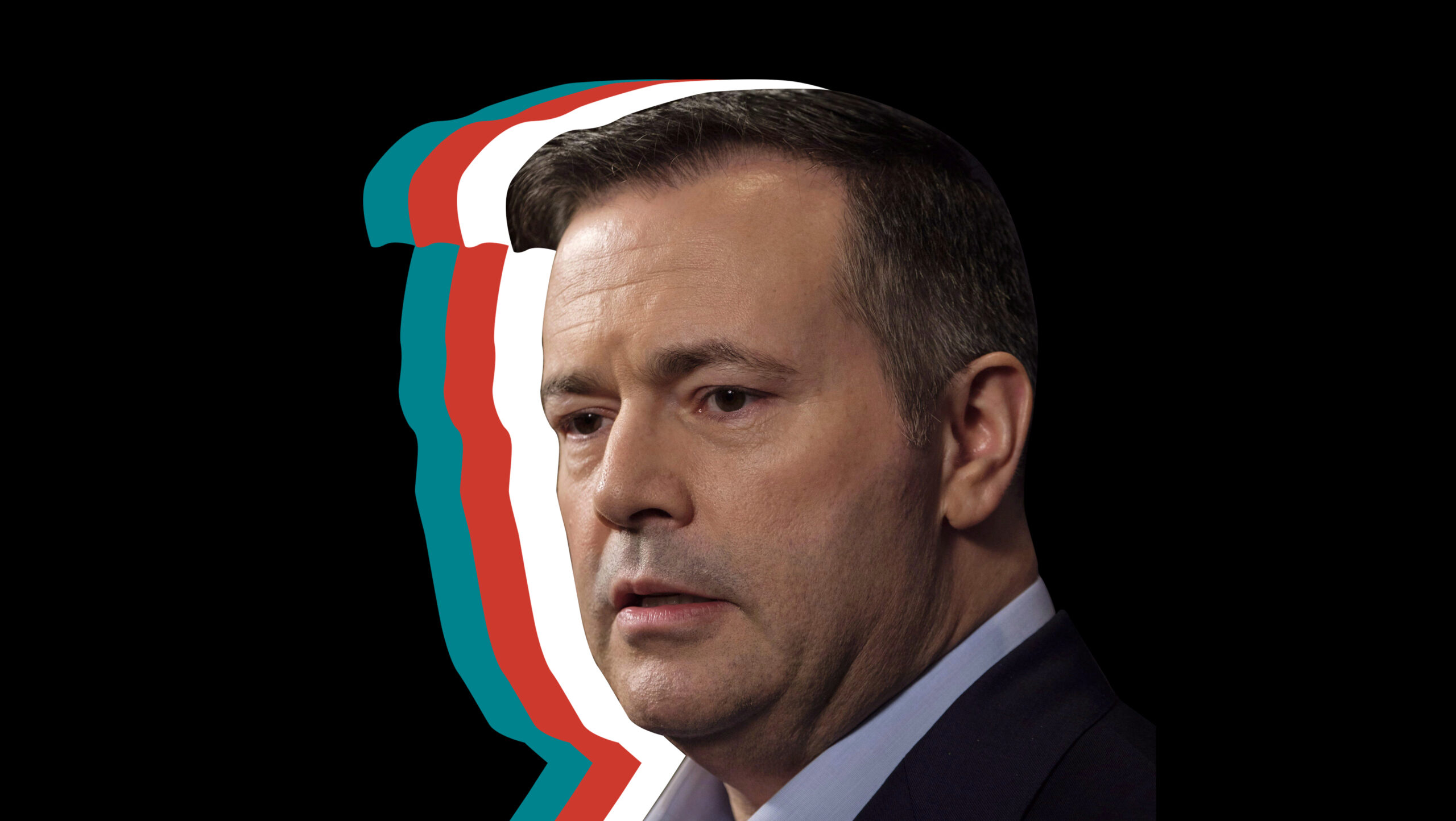Jason Kenney is the new premier of Alberta.
Yesterday, his United Conservative Party (UCP) unseated Rachel Notley and the NDP. The UCP won 63 seats, making them a majority government, while the NDP has been relegated to the official opposition with 24 seats.
The win marks the province’s return to centre-right politics after Notley won in 2015 and disrupted 44 years of Progressive Conservative governance in Alberta.
In his prepared victory speech, Kenney said, “This Alberta is a place where we judge people not on the basis of where they were born, how they pray or who they love, but on how hard they work, and how well they treat others. That is the idea of Alberta will animate our new government.”
That statement sounds nice, but what does a UCP victory mean for LGBTQ2 people?
First, let’s travel down memory lane
In March, during Alberta’s divisive election campaign, the NDP tweeted archival footage of Kenney’s speech made to the Canadian Alliance in 2000. In it, Kenney described his role in repealing the spousal law that allowed gay men to visit their dying partners during the height of the AIDS epidemic. This was not the first time the clip had surfaced.
In December, lawyer and activist Kyle Marrow tweeted a 29-second clip of the speech in which Kenney is heard saying: “I became president of the pro-life group in my campus and helped to lead an ultimately successful initiative petition, which led to a referendum which overturned the first gay spousal law in North America.”
LEAKED AUDIO: Listen to Jason Kenney (@jkenney) brag about overturning a spousal law that permitted gay men to visit their dying partners in the hospital during the AIDS epidemic. He’s disgusting! #hoc #ableg #cdnpoli pic.twitter.com/dFvr9bweK4
— Kyle Morrow (@kylemmorrow) December 1, 2018
UCP board member Cody Johnston quit the party over Kenney’s remarks on LGBTQ2 rights. Johnston told Vice Kenney has never gone on the record to apologize for his previous comments despite many opportunities to do so.
“We’ve all seen his record — which is one thing — but to see someone stand in front of a group of supporters and brag about denying people basic human rights is much more serious. This was like definitive proof,” Johnston said.
In a statement to Vice, Kenney’s spokesperson Christine Myatt explained since that speech Kenney’s “views on these issues have evolved since then, as have society’s.”
In recent years, Kenney has tweeted about volunteering at an AIDS hospice in San Francisco and even posted a video on World AIDS Day thanking scientists, donors and volunteers in the fight against AIDS. He says he “saw the disease firsthand” while “volunteering at a hospice in San Francisco.”
But the release of the audio clip has catalyzed a conversation about Kenney’s history of anti-LGBTQ2 actions and comments. For instance, in 1998, Kenney, who was an MP under the Reform Party at the time, demanded that then-premier Ralph Klein invoke the notwithstanding clause because he didn’t want to “enforce gay rights.”
I did not know this: Jason Kenney once wanted the notwithstanding clause to be used in Alberta so that they could still fire people for being LGBT pic.twitter.com/5l1onZaQPT
— Jesse Hawken (@jessehawken) September 11, 2018
In 2005, Kenney, who was serving as the Member of Parliament for Calgary Southeast, voted against same-sex marriage. In a speech during Question Period, discussing the bill to legalize same-sex marriage, Kenney said it changes the meaning of family.
“The bill seeks to change fundamentally the meaning of an institution that has existed in every civilization through all of recorded history, an institution that predates the state itself,” Kenney said. “The government undertakes a radical social experiment, whose consequences on children, social stability, religious freedom and civil society are both unseen and unknowable.”
Kenney also said that by trying to pass the bill, “the government seeks to play a trump card called human rights, the desired effect of which is to de-legitimize any opposition to the radical project as contrary to human dignity and Canadian values.”
He added, “this strategy . . . cheapens the precious currency of human rights by seeking to inflate an ordinary political demand into a requirement of fundamental justice.”
Eight years later, in 2013, Kenney voted against a bill that would have added gender identity and expression as prohibited grounds of discrimination in the Canadian Human Rights Act.
Kenney also holds a controversial stance on immigration. In 2011, when he was immigration minister, Kenney introduced the niqab ban; in 2014, when he was employment minister, Kenney criticized the live-in caregiver program as “being out of control and having mutated into a program of family reunification.” Kenney also has a history of anti-abortion activism, though he has since denied plans to bring forward legislative measures on abortion.
Now what?
Last month, Jason Kenney announced his party’s plans for the provincial education system, which included rolling back some protections for LGBTQ2 students.
One affects gay-straight alliances (GSAs) in schools. In his proposal, Kenney said a UCP government will still allow students to set up the alliances, but if teachers feel a student’s health or safety is at risk, they have the option to tell parents that their child has joined. The announcement caused an uproar — for queer and trans students and allies, GSAs are safe spaces to hang out and talk.
The Alberta School Act originally required schools to inform parents when topics related to religion and sexuality were to be discussed in class, and allowed parents to pull their children from those classes. But, in 2017, Alberta Premier Rachel Notley’s government passed Bill 24, which amended parts of the Act and barred school officials from informing parents of their child’s participation in a GSA except if the student was in danger.
Kenney’s proposed plan means reverting to pre-2017 policies.
In response to Kenney’s announcement, the hashtag #QueerKidsAB made waves on social media and became Canada’s top trending topic in March. It also catalyzed a protest outside of the Alberta legislature.
In an interview with a local radio show in Calgary, Mike Morrison, an LGBTQ2 blogger and one of the first to use #QueerKidsAB, said that informing parents of their child’s involvement in a GSA could potentially harm them if the parents hold anti-LGBTQ2 beliefs.
Recent studies show that Canadian LGBTQ2 youth are more likely to end up homeless due to an inability to get along with their parents when compared to their heterosexual cisgender peers. LGBTQ2 youth are also at higher risk of being victims of suicide compared to heterosexual youth — difficulty with self-acceptance and social stigmatization are considered possible factors of this heightened risk.
Morrison says Kenney should keep this in mind when thinking of nullifying Bill 24. “If one kid dies because of Jason Kenney’s rollback, that’s one too many,” he said.
What about the other UCP candidates?
Jason Kenney is not the only UCP candidate who faced controversy.
Mark Smith, who was just re-elected as MLA for Drayton Valley-Devon, encountered backlash when a clip of his 2013 sermon at the Calvary Baptist Church surfaced in which he likened homosexuality to pedophilia.
In the sermon, Smith said, “You don’t have to watch any TV for any length of time today where you don’t see on the TV program them trying to tell you that homosexuality and homosexual love is good love . . . Heck, there are people out there, I could take you to places on the [internet] I’m sure, where you can find out, where pedophilia is love.”
Another re-elected UCP candidate, Roger Reid, called an Islamophobic book one of his favourites. He also served as the director of communications for the First Alliance Church in 2003 when it published a newsletter containing a book review of The Homosexual Agenda, which argues that LGBTQ2 activists are trying to trump religious people’s rights.
In a statement, Reid said his views have since evolved saying, “Albertans are tired of revisiting old, divisive debates from many years prior.”
What are people saying about the UCP win?
Here are some of the responses online.
My heart aches for all the LGBT2Q kids Jason Kenney thinks it’s okay to out against their wishes. This is the choice many Albertans made.
— Brandon Yan (@CitizenYan) April 17, 2019
Jason Kenney, a man who kept gay people from visiting their partners as they were dying of AIDS is playing “We are the Champions,” a song sung by a gay man who died of AIDS at the victory party. That’s the state of Alberta politics right now.
— Nigel Kirk (@nkirk4homeless) April 17, 2019
Remember when we were so full of ourselves after Donald Trump won?
Canada’s different, we said. Not in my Canada, we said. Canada’s not a racist and homophobic country, we said. We’d never do that, we said.
Yeah we just elected this. pic.twitter.com/PqEEH0fNdX
— Mike Gibbs (@Mikeggibbs) April 17, 2019
Be sad tonight, it’s a sad night. And it’s okay to be sad.
But when you’re ready, be motivated. Be thoughtful. Be welcoming. We are going to have a lot of people to guide and protect, especially LGTBQ children. And I’m ready whenever you are. #abvote
— Mike Morrison (@mikesbloggity) April 17, 2019


 Why you can trust Xtra
Why you can trust Xtra


